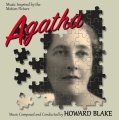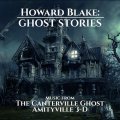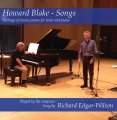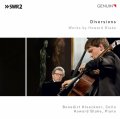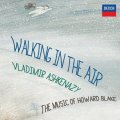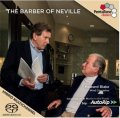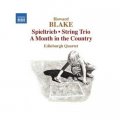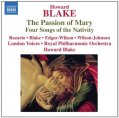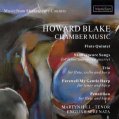 Highbridge Music Ltd.
Highbridge Music Ltd.
Studio 6, 18 Kensington Court Place, London W8 5BJ, UK
Email: howard@howardblake.com
HOWARD BLAKE – EXTENDED BIOGRAPHY
Howard began playing the piano by ear at the age of 6, and the following year started lessons. He was given vocal training as a boy-soprano and on entering Brighton Grammar School took lead roles in their annual operas: Rose Maybud in 'Ruddigore', Bessie Throckmorton in 'Merrie England' and Josephine in 'HMS Pinafore'. At 12 he began organ lessons, soon playing services for the parish church, St. Augustine's. His talent as a pianist was recognised at 16 by the eminent teacher Maud Hornsby. She introduced him to Christine Pembridge who had studied with Margaret Long and Adelina de Lara - once a pupil of Clara Schumann. Howard had had little serious coaching up to this point but the following spring won the Hastings Competitive Festival and three years at The Royal Academy with Harold Craxton for piano and Howard Ferguson for composition. Required to write a set of variations on a theme of Bartok he composed a complex piece of virtuosic piano writing which Craxton suggested his pupil ‘Dody’ Tryggvaason perform in her final Academy recital programme. Shortly after this she went to study in Moscow where she was to meet and marry Vladimir Ashenazy. Howard was then invited to form a duo with the leader of the RAM orchestra, violinist Miles Baster. They explored much of the repertoire for that medium and learnt a number of the works by heart, including the Cesar Franck Sonata. However Miles won a scholarship to the Juillard and while he was away Howard began to take interest in film as a serious art form and the possibilities of combining music and image. The duo came to an end and as Howard's tenure at RAM expired he found himself in a quandary, not wishing to teach and desperately wanting to experiment with film and composition.
Fortuitously he was offerred a job at The National Film Theatre and there was able to direct the film 'A Few Days' for which he also wrote the script and music. The film was shown in the NFT, acquired by the British Film Institute and Howard was offerred a scholarship to study film direction. He decided against this however, having realised that his passion lay more in music than anything else. He now returned to it, but wanting to broaden his interests in all types of music. His ability to play the piano not only by ear, but also in almost any style, resulted in an offer to work as a recording session pianist, initially at Abbey Road Studios, and then at film, television and recording studios. He found this experience intensely interesting, working with many distinguished musicians in all genres and learning from them. EMI itself invited him to make two albums on which he played various types of keyboard instruments experimenting with multi-track techniques in their Studio 2, the first studio to introduce them.
In 1966 he began playing on sound-tracks for the internationally-succesful series 'The Avengers', but a year later, at the suggestion of composer Bernard Herrmann, took over from Laurie Johnson on 14 episodes as both composer and conductor. In fact it was Bernard Herrmann (at one time director of the CBS Symphony Orchestra in USA) who encouraged him to conduct and gave him some coaching. Another mentor was Eric Leinsdorf who proferred the advice: 'Either you can conduct or you can't'. Howard was thrown in at the deep end when the famed US music-producer Quincy Jones invited him to conduct an orchestra of 120 players in a soundtrack album recording of the 70mm film epic 'McKenna's Gold'. He became in such demand as composer and conductor that for a while his piano-playing somewhat lapsed although when Quincy recorded his score for 'The Italian Job' he chose Howard to play keyboards.
In 1970 he sufferred a collapse from overwork and after spending some time out down in Cornwall decided to retreat to the Sussex countryside and re-visit his whole view and practise of music, studying counterpoint, harmony and musical form in a rigorous daily timetable, one part of which was also to re-work his piano-playing. One result of this was the creation of the Piano Quartet which he wrote for and recorded with violinist Jack Rothstein, violist Kenneth Essex and cellist Peter Willison, a recording of which was issued on Naxos.
In 1975 encouraged by his friend Vladimir Ashkenazy he composed 'Twelve Piano Pieces' giving the premiere himself on BBC radio. Recordings he made of this work were heard by choreographer Robert North at The London Contemporary Dance Theatre and were to form the score of a ballet 'Meeting and Parting' premiered in The Chatelet Theatre in Paris with Howard as pianist.
In 1977 he was signed to create a score for Ridley Scott's film debut masterpiece 'The Duellists', which gained the Special Jury Prize at the Cannes Festival. This is one of Howard's favourite scores, and he composed, orchestrated and conducted it. A spate of further films followed and his concentration tended to be on composing/conducting his own scores, although quite frequently he was engaged as conductor for The National Philharmonic Orchestra, and the experience that Howard gained from all of this was incalculable.
Returning to live in London in the early eighties, he was signed as a composer by Faber Music, a contemporary classical music publishing company noted for publishing Benjamin Britten. This signing closely followed Howard's composition of the animated film 'The Snowman', the score of which he conducted and produced. He also wrote lyrics for the song ‘Walking in the Air’ and a narration for the concert version issued as an LP by CBS Masterworks. That Christmas Raymond Gubbay invited him to conduct the first performance of the concert version. Howard was now firmly established as both a composer and a conductor and when he completed his Clarinet Concerto for The English Chamber Orchestra in 1984 was invited to conduct both the South Bank premiere and the CD for Hyperion Records with Thea King as soloist.
The album of 'The Snowman' with Bernard Cribbins as narrator 'went platinum' and the unprecedented success of what was essentially a work for solo treble and chamber orchestra caused an extraordinary signing by CBS Masterworks/Sony in 1988 where Howard was given his own record label and a virtually free hand to record his own works. They released 'Granpa' with Peter Ustinov and Sarah Brightman and the large-scale oratorio 'Benedictus' with Sir David Willcocks, Robert Tear and the Royal Philharmonic Orchestra. The Philharmonia Orchestra commissioned Howard to compose a Piano Concerto to celebrate Princess Diana’s 30th birthday and he was asked if he would also consider playing it. He agreed and Sony recorded it. The premiere took place in May 1991 and Howard was able to meet Princess Diana and present her with a CD after the concert at The Royal Festival Hall. This was a high-point in his career and a joyful vindication of his many years of struggle with both composition and piano.
How can one explain such a career? The distinguished musicologist and critic Christopher Palmer wrote as follows:
‘Most composers, like other people, have to earn their own living once their training is completed and, from the 1920's on, many such professionally-trained composers have welcomed the opportunity to write for radio, film, television and other media outlets. One of two things generally happens to these composers: either they give up composing their 'own' music altogether, or - more often- the one career runs parallel to the other. What is almost unheard of is for a composer deliberately to abandon a flourishing career in media-music, in mid-course, in order to devote himself exclusively to his 'own' or 'real' music. Yet this is what Howard Blake has done. What is even more unusual is that far from disowning his alter ego, the kind of musician he was and the kind of music he produced for the first ten years of his professional life, he found in them the mainspring of a remarkable personal renaissance. Much of the raw material of his most significant works -the Toccata for Orchestra and the Piano Concerto- derives from this source, but so refined, processed, enhanced, sublimated, as to be scarcely recognisable. The end product has a deceptive simplicity not unlike that of of Mozart. I mention Mozart advisedly since the classical qualities implicit in scores like ‘The Snowman’ and the ‘Diversions for Cello’ are on full frontal display in the ‘Piano Concerto’ . There is a child-like exuberance and spirit of delight...but a shrewd supervisory intelligence plots every move...and never allows the plain, ordinary, even commonplace musical language it speaks ever to sound plain, ordinary or commonplace. Much of this is due to a strong feeling for line, and not just melody. Counterpoint is far more the essence of Blake's music than harmony. To cast a full-scale concert work in a simple diatonic style with no sense of deja vu is a considerable achievement.’
Another view was expressed by Pamela Collins in The Encyclopedia of Contemporary Composers
‘Howard is that rarity in the contemporary music scene, a genuinely popular composer. If he has a recent parallel, it is probably Leonard Bernstein, though he is an altogether more ‘natural’, less troubled composer than Bernstein even at his gentlest. Blake’s reputation rests very squarely on the success of the acclaimed children’s film ‘The Snowman’ and particularly on its haunting theme ‘Walking in the Air’. Since its first performance in 1982 the piece has become a Christmas classic both in its animated form on British television and in its theatrical form as a record-breaking full-length ballet. Its merits are the classical merits par excellence, clearly audible in all Blake’s concert music. The purity of line and lack of clutter that make ‘Walking in the Air’ so utterly and immediately memorable, is also what animates the Clarinet Concerto and complements his apparent conviction that imaginative composition is still feasible within a constantly renewing harmonic tradition. After an immensely successful period in his 20s at the peak of the London music scene, he retreated to the country to work again at the basic pillars of harmony and counterpoint, slowly refining a technique and language that have little in common with much contemporary academic music. His most obvious (distant) influence is Mozart, but there is also something of his one-time teacher Howard Ferguson's neo-classical idiom and a strong sense of music as a cultural adhesive, rebonding a society fractured by civilisation and its discontents. Recordings of his music grow ever-more numerous and performances and releases take place around the world. Blake is unembarrassed and unhindered by his popularity. It is, as it was with Mozart, simply a response to a spontaneous melodic gift underpinned with considerable technical skill.’
Howard Blake was awarded the O.B.E. for services to music in 1994 by The Queen and is a Fellow of The Royal Academy of Music.
